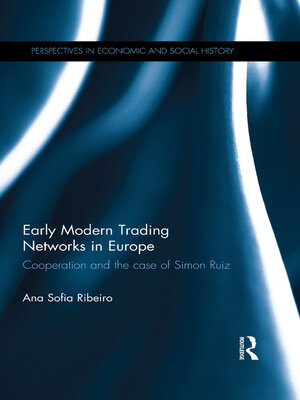Early Modern Trading Networks in Europe
ebook ∣ Cooperation and the case of Simon Ruiz · Perspectives in Economic and Social History
By Ana Sofia Ribeiro

Sign up to save your library
With an OverDrive account, you can save your favorite libraries for at-a-glance information about availability. Find out more about OverDrive accounts.
Find this title in Libby, the library reading app by OverDrive.



Search for a digital library with this title
Title found at these libraries:
| Library Name | Distance |
|---|---|
| Loading... |
In the early modern period, trade became a truly global phenomenon. The logistics, financial and organizational complexity associated with it increased in order to connect distant geographies and merchants from different backgrounds. How did these merchants prevent their partners from dishonesty in a time where formal institutions and legislation did not traverse these different worlds? This book studies the mechanisms and criteria of cooperation in early modern trading networks. It uses an interdisciplinary approach, through the case study of a Castilian long-distance merchant of the sixteenth century, Simon Ruiz, who traded within the limits of the Portuguese and Spanish overseas empires. Early Modern Trading Networks in Europe discusses the importance of reciprocity mechanisms, trust and reputation in the context of early modern business relations, using network analysis methodology, combining quantitative data with qualitative information. It considers how cooperation and prevention could simultaneously create a business relationship, and describes the mechanisms of control, policing and punishment used to avoid opportunism and deception among a group of business partners. Using bills of exchange and correspondence from Simon Ruiz's private archive, it charts the evolution of this business network through time, debating which criteria should be included or excluded from business networks, as well as the emergence of standards. This book intends to put forward a new approach to early modern trade which focusses on individuals interacting in self-organized structures, rather than on States or Empires. It shows how indirect reciprocity was much more frequent than direct reciprocity among early modern merchants and how informal norms, like ostracism and signalling, helped to prevent defection and deception in an effective way. This book will be of interest to all early modern historians, especially those with an interest







